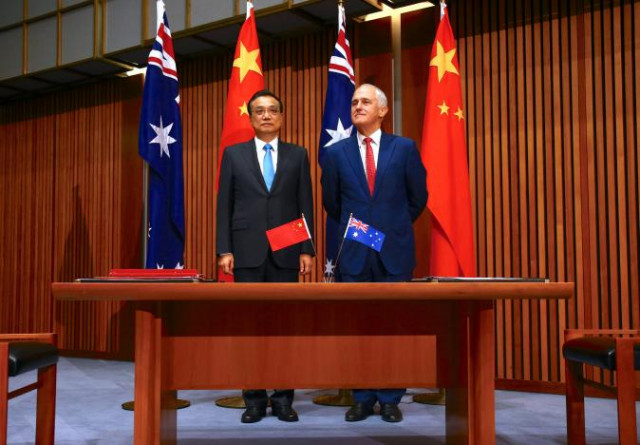Australia, China to boost trade with beef making the cut
Countries expected to sign deals on beef exports, energy and security

Australia's Prime Minister Malcolm Turnbull stands with Chinese Premier Li Keqiang before the start of an official signing ceremony at Parliament House in Canberra, Australia, March 24, 2017. PHOTO: REUTERS
Australia is seeking to take advantage of China’s decision earlier this week to suspend meat imports from Brazil, the world’s biggest exporter of beef and poultry, due to a scandal over sales of rotten and salmonella-tainted meat.
Australia, however, may have little scope to increase meat exports as its cattle herd is languishing near a two-decade low. Graziers culled cattle in record numbers following a drought induced by an unusually strong El Nino weather system between 2014 and 2016.
Australia opens door to China in push to save TPP
Beef is among Australian agriculture exports to China that were worth more than $6.14 billion last year. They have been propelled by the wide-ranging China-Australia Free Trade Agreement signed in 2015, cementing China’s position as Australia’s largest trading partner.
“China must feed their nation but has 7% of arable land. Australia is seizing the opportunity to provide the high-quality, safe food,” Prime Minister Malcolm Turnbull said in a speech in Canberra.
Trade agreements
Australia must choose between United States and China: US Army official
Turnbull said he will also seek to progress a possible regional trade agreement as Australia seeks to minimise the impact of President Donald Trump pulling the United States out of the Trans-Pacific Partnership in January, effectively killing the accord in its current form.
While Trump has advocated an “America First” approach, China has signalled its desire to play a bigger international role, particularly in promoting free trade, a stance reinforced by Li.
“We believe that to resolve trade imbalances we need to continue to expand trade. That is the solution. We cannot close our doors,” said Li.
Published in The Express Tribune, March 24th, 2017.
Like Business on Facebook, follow @TribuneBiz on Twitter to stay informed and join in the conversation.



















COMMENTS
Comments are moderated and generally will be posted if they are on-topic and not abusive.
For more information, please see our Comments FAQ